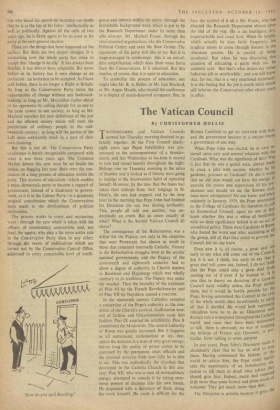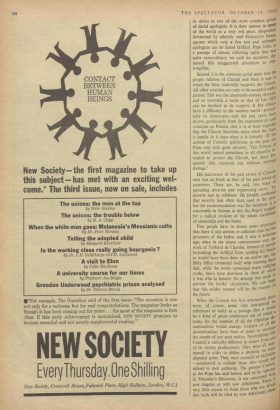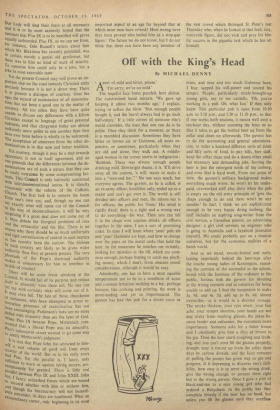The Vatican Council
By CHRISTOPHER HOLLIS Ht.:NoEasioRms and Vatican Councils seemed last Thursday morning destined to go fatedly together. At the First Council ninety- eight years ago Papal Infallibility was pro- nounced to the accompaniment of a thunder- storm, and last Wednesday at tea-time it started to rain and rained heavily throughout the night. Bishops rose on Thursday morning to the salvo of thunder and it looked as if history were going tc indulge in the inconvenient habit of repeating herself. However, by the time that the buses had taken their bishops from their lodgings to St. Peter's, the rain had stopped, and by the time later in the morning that Pope John had finished his Discourse the sun was shining brilliantly. This, people all told one another, was un- doubtedly an omen. But an omen exactly of what? What is the Second Vatican Council all about?
The consequence of the Reformation was a defeat for the Papacy, not only in the countries that went Protestant, but almost as much in those that remained nominally Catholic. Victory in the Reformation struggles went to the secular national governments, and the Papacy of the seventeenth and eighteenth centuries had to allow a degree of authority in Church matters to Bourbons and Hapsburgs which was wholly contrary to its traditions. The Papacy was under the weather. Then the brutality of the treatment of Pius VI by the French Revolutionaries and of Pius VII by Napoleon caused a reaction.
In the nineteenth century Catholics accepted a reassertion of the Pope's authority as the con- dition of the Church's survival. Gallicanism went out of fashion and Ultramontanism came into fashion. Pius IX asserted his infallibility. Pius X condemned the Modernists. The central authority of Rome was greatly increased. But it happens in all autocracies, ecclesiastical or lay, that, unless the autocrat is a man of very great energy, before long the reality of power comes to be exercised by the permanent court officials and the nominal autocrat finds how little he is able to do. This was undoubtedly the situation that developed in the Catholic Church in this cen- tury. Pius XII, who was a man of extraordinary energy, attempted to remedy it by taking enor- mous powers of decision into his own hands. He dispensed with a Secretary of State, doing the work himself. He made it difficult for the
Roman Cardinals to get an interview with him, and the government became to a unique extent a government of one man.
When Pope John was elected, he at once re- stored more easy and normal relations with the Cardinals. What was the signifiance of this? Was it just that he was a genial man, always ready to crack a joke with anyone, whether he be gardener, prisoner or Cardinal? Or did it mean that an old man would not have the energy to exercise the power and supervision of his pre- decessor and should we see the Roman curia once more omnipotent? No one knew, and when suddenly in January, 1959, the, Pope announced to the College of Cardinals his intention to call an Ecumenical Council, again no one at first knew whether this was a whim of bonhomie with no deep significance behind it or an act of considered policy. There were Cardinals in Rome who feared the worst and who, according to all the gossip, did all that they could to prevent the Council, but no one knew.
Even now it is, of course, a great deal too early to say what will come out of the Council; but it is not, I think, too early to say that !I. great deal will come •out. Indeed, I do not think that the Pope could stop a great deal from coming out of it even if he wanted to. It is . true that in theory no decisions of a General Council have validity unless the Pope ratifies them, but it would be hardly possible for the Pope. having summoned this Council in the eYes of the whole world, then incontinently to reject all that it decided. He would look supremely ridiculous were he to do so. Discontent with Roman rule is widespread throughout the Catholic i world, and once they have been summoned to talk, there is obviously no way of stopping the bishops of France and Germany. in Par ticular, from talking to some purpose. In any event, Pope John's Discourse made it abundantly clear that he has no wish to sto.1: them. Having summoned the bishops of tri. world to advise him, the Pope could hardlY take the opportunity of an introductory course to tell them in detail what advice ethey.
cteci
should give him. Indeed, many had exP s little more than some formal and pious words 0". welcome. They got much more than that. c The Discourse is notable because it give, lie direct to two of the most common points of curial apologists. It is their custom to speak of the world as a very evil place, desperately threatened by atheistic and destructive forces, against which only a few just and orthodox apologists can be found faithful. Pope John, in a passage of almost rollicking satire that was quite extraordinary on such an occasion. dis- missed this exaggerated pessimism as can' temptible.
Second, it is the common curial point that the proper relation of Church and State is one in which the State materially supports the Church- All other relations are only to be accepted under protest. This was the nineteenth-century demand, and so venerable a name as that of Leo Of can be invoked to its support. It has always been a difficulty in the modern world—particu. larly to Americans—and the last years have shown, particularly from the experience of such countries as Poland, that it is at least arguable that the Church flourishes more when the State is hostile to it than when it is friendly. Of the actions of Catholic politicians in the past the Pope said with quiet sarcasm, 'The Princes of this world indeed sometimes in all sincerity in- tended to protect the Church, but more ire' quently .this occurred not without spiritual damage.'
His indictment of the past errors of Church: men was as frank as that of the past errors LI
statesmen: There are, he said, two ways spreading doctrine and suppressing error: Di severity and by mildness.' He frankly confessed that severity had often been used in the Past' but his recommendation was for mildness. It is, reasonable to foresee in this the Pope's supPaii for a radical revision of the whole machinery of censorship and the Index. Few people have in recent years pretended that there is any serious or coherent case for the processes of the Index, and it was a wcicanle sign when in the recent controversies over the work of Teilhard de Chardin, instead of merely forbidding the faithful from reading his w°11's as would have been done in an earlier age. the Holy Office contented itself with warning them that, while the books contained many edifYi,litig truths, there were doctrines in them of whie,„ it was wise to beware. No attempt was made '" prevent the books' circulation. We can hop; that this milder manner will be the manner
the future.
When the Council was first announced, there s were, of course, some who interpreted 1,, references to unity as a presage that it would be a kind of peace conference out of which,_ treaty for the reunion of all the Christian de- nominations nominations would emerge. leaders of all the denominations have been at pains to disabuse the simple of any such notion. Nevertheless, 13-1,,, Council is radically different in nature from an], of its twenty predecessors. They were all summe moned in order to define a doctrine 011 s°.„, disputed point. They were councils of cxclusa-'0",
—summoned to exclude those who w ouCounci
ld n l' new dogmas or with new definitions. There very little reason to think those who are afraid that faith will be tried by new definitions about submit to their authority. The present as the Pope has said before, and as he rePeatc.i,d in Thursday's Discourse, is not concerned THE SPECTATOR. OCTOBER 19. Our Lady will find their fears at all necessary and it is to be most earnestly hoped that the rumours that Pius IX is to be beatified will prove equally unfounded. Pius IX, as we can see from, for instance, Odo Russell's letters about him Which Mr. Blakiston has recently published, was in certain moods a genial old gentleman, but there was in him no kind of mark of sanctity. To canonise him could only be a joke, but a Joke in most execrable taste
Yet the present Council may well
prove an im- portant step on the road towards Christian unity Precisely because it is not a direct step. There I$ at present a dialogue of courtesy. Over the ages the record of ecclesiastics of all denomina- tions has not been a good one in the matter of courtesy. All too often they have been quite linable to discuss any differences with a fellow Christian except in language of great personal rudeness, and that clergymen today are almost uniformly more polite to one another than they have ever been before is wholly to be welcomed. The acceptance of observers from the other de- nominations is in that new and better tradition. Yet courtesy, though it may be a step towards agreement, is not in itself agreement, and no one pretends that the differences between the de- nominations are of such a nature that they can be easily overcome by some compromising for- mula. This Council is only indirectly concerned With interdenominational union. It is directly concerned with the reform of the Catholic Church. The first task is to remove the beam from one's own eye, and, though no one can !ay exactly what will come out of the Council in the way of decentralisation, it will be very surprising if a great deal does not come out of it Wien debate the liturgical problems of rites i and the vernacular and the like. There is no reason why there should be so much uniformity and rigid centralisation of control in such matters as has recently been the custom. The bishops In each country are likely to be given- wider authority than they at present possess. The very Plenitude of the Pope's doctrinal authority makes it
unnecessary for him to interfere in details of conduct.
There will be some frank speaking at the Council It It would fail of its purpose and reduce Itself to absurdity were there not. No one can yet say with certainty what will come out of it. It may even fail. The fate of those, churchmen or statesmen, who have attempted to arrest re- morseless processes of centralisation has not been encouraging. Parkinson's laws are no more defied With impunity than are the laws of God. "nen Pius IX became Pope, Metternich com- Tented that a liberal Pope was an absurdity. 1:1ts s subsequent career seemed to go some way 0 justify Metternich's judgment. , _ is true that Pope John has attracted to him- self a vast volume of good will from every quarter of the world. But so in his early years Pius. Yet the parallel is, I fancy, only ssufficientnt to warn
i
0 warn us against taking success pre- for granted. There is little real parallel between Pius IX and John XXIII. John has, fancy, unleashed forces which are bound to whether with him or without him, a ° ted though the bureaucracy will not immedi- 7_ly surrender, its days are numbered. What an extraordinary career, only beginning in its most
important aspect at an age far beyond that at which most men have retired! How wrong have they been proved who hailed him as a stop-gap figure! The future we do not know, but I do not think that there can have been any member of the vast crowd which thronged St. Peter's last Thursday who, when he looked at that frail, tiny, venerable figure, did not wish and pray for him fo: success in the gigantic task which he has set himself.
















































 Previous page
Previous page